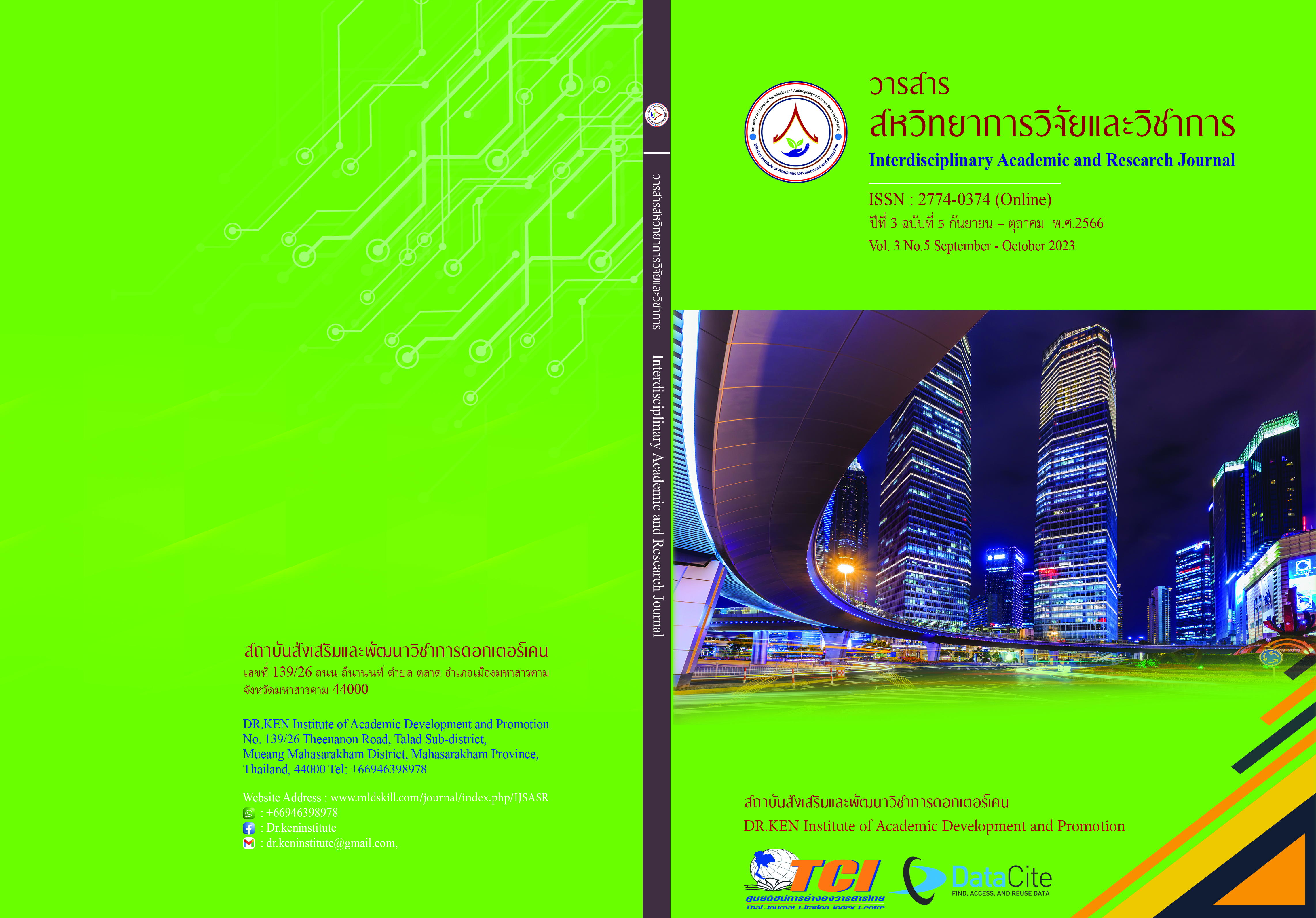Development of Training Courses to Enhance the Ability to Organize Teaching English for Elementary Teachers under the Local Government Administrative Organization in Khon Kaen
DOI:
https://doi.org/10.14456/iarj.2023.271Keywords:
Training Courses;, Teaching and Learning EnglishAbstract
English is the common language used to communicate. Thai people should have a good basic knowledge of English to communicate effectively. English teachers need to raise and improve themselves first and foremost. They are ready to learn management skills to keep up with changes. Therefore, the researcher has developed a training curriculum to promote English language learning management skills for primary school teachers. The purposes of this research were 1) to study the basics of the training curriculum development, 2) to develop the curriculum, 3) to test the curriculum, and 4) to study the effectiveness of the training curriculum. The research was divided into 4 phases. Phase 1 is to study basic data. Phase 2 is to develop the curriculum. Phase 3 is to start the curriculum. The last phase is to study its effectiveness. The samples in the study are 170 elementary English teachers in the schools under the local government administrative organization in Khon Kaen Province by the training need survey. 118 people as determined samples are obtained by using the Craigie and Morgan tables. The interviewed group is 10 elementary school principals with primary English teachers. They are selected by purposive sampling. Target groups target experts in the seminar based on connoisseurship. The tools for data collection are questionnaires, interview forms, conformity assessment forms, and appropriate and necessary tests. Statistics for data analysis are percentage, mean, standard deviation, and One-Samples t-test. The results showed that (1) A study of basic information for the training curriculum development found that most English teachers at the elementary level did not complete the English major and have a desire for self-improvement in teaching and learning with training in all aspects at a high level. (2) The development of the training g course consists of 7 parts: 1) background and importance of the problem, 2) principles, 3) objectives, 4) content, 5) training activities, 6) media and learning resources, and 7) evaluation and assessment. The quality assessment of the curriculum was evaluated by the experts. It was found that the curriculum is commodified and suitable at a high level. (3) The experimental training showed that 30 participants who had scored credit before and after the course enhanced their organized teaching English delivered process and outcome efficiently by more than 80 percent, statistically significant at the .01 level. And (4) The results of the study of the effectiveness of the training program found that the learning management plan of the trained English teachers overall had the appropriate quality at the highest level, and elementary school students had overall opinions on teaching and learning management at a high level.
References
กระทรวงศึกษาธิการ. (2560). แนวปฏิบัติตามประกาศกระทรวงศึกษาธิการ เรื่อง นโยบายการปฏิรูปการเรียนการสอนภาษาอังกฤษ. กรุงเทพฯ: กระทรวงศึกษาธิการ.
ชนิตา รักษ์พลเมือง และคณะ. (2558). รายงานวิจัยสภาวะการขาดแคลนครูในระดับการศึกษาขั้นพื้นฐานของประเทศไทย. รายงานการวิจัย. กลุ่มนโยบายเพิ่มขีดความสามารถในการแข่งขันของประเทศ สำนักนโยบายและแผนการศึกษา สำนักงานเลขาธิการสภาการศึกษา.
ชูชัย สมิทธิไกร. (2540). การฝึกอบรมบุคลากรในองค์กร. กรุงเทพฯ: จุฬาลงกรณ์มหาวิทยาลัย.
ธงชัย สันติวงษ์. (2539). การบริหารงานบุคคล. พิมพ์ครั้งที่ 8. กรุงเทพฯ: ไทยวัฒนาพานิช.
บุญชม ศรีสะอาด. (2554). การวิจัยเบื้องต้น ฉบับปรับปรุงใหม่. พิมพ์ครั้งที่ 8. กรุงเทพฯ: สุวีริยาสาสน์.
แพรวพรรณ บุญฤทธิ์มนตรี. (2550). การฝึกอบรมเพื่อเพิ่มประสิทธิภาพการสอนงานให้กับหัวหน้างาน ในโรงงานอุตสาหกรรมอิเล็กทรอนิกส์: ศึกษากรณี บริษัท แคล-คอมพ์ อีเล็คโทรนิคส์ (ประเทศไทย) จำกัด (มหาชน). ปริญญานิพนธ์ปริญญาการศึกษาดุษฎีบัณฑิต สาขาวิชาการศึกษาผู้ใหญ่: มหาวิทยาลัยศรีนครินทรวิโรฒ.
วารุณี อัศวโภคิน. (2554). การพัฒนาหลักสูตรฝึกอบรมการใช้ภาษาอังกฤษเพื่อการสื่อสารของบุคลากรสายสนับสนุนวิชาการ มหาวิทยาลัยศรีนครินทรวิโรฒ. ปริญญานิพนธ์ปริญญาการศึกษาดุษฎีบัณฑิต สาขาวิชาการศึกษาผู้ใหญ่: มหาวิทยาลัยศรีนครินทรวิโรฒ ประสานมิตร.
วิจิตร ศรีสอ้าน. (2552). การประชุมวิชาการระดับชาติ 2552: ปีแห่งคุณภาพการอุดมศึกษาไทย. กรุงเทพฯ: สำนักงานคณะกรรมการการอุดมศึกษา
สงัด อุทรานันท์, (2537) ). พื้นฐานและหลักการพัฒนาหลักสูตร. กรุงเทพฯ: วงเดือนการพิมพ์.
สำนักงานคณะกรรมการการศึกษาขั้นพื้นฐาน. (2559). นโยบายปีงบประมาณ พ.ศ.2560 สำนักงานคณะกรรมการการศึกษาขั้นพื้นฐาน. กรุงเทพฯ: โรงพิมพ์ชุมนุมสหกรณ์การเกษตรแห่งประเทศไทย จำกัด.
สุรางค์ โค้วตระกูล. (2541). จิตวิทยาการศึกษา. กรุงเทพฯ: โรงพิมพ์แห่งจุฬาลงกรณ์มหาวิทยาลัย.
สุไร พงษ์ทองเจริญ. (2559). การสอนภาษาอังกฤษระดับประถมศึกษา. พิมพ์ครั้งที่ 3. กรุงเทพฯ: มหาวิทยาลัยสุโขทัยธรรมาธิราช.
Chang, R.Y. (1995). Creating High-Impact Training: A Practical Guide to Successful Training Outcomes. London: Konan Page.
Glatthorn, A.A., & Fox, L.E. (1996). Quality Teaching Through Professional Development. California: Corwin Press, Inc.
Krejcie, V.R., & Morgan, W.D. (1970). Determining sample size for research activities. Educational and Psychological Measurement. 30(3), 608-609.
Oliva, P.F. (1992). Developing the Curriculum. 3rd edition. New York: Harper Collins.
Saylor, J.G., & Alexander, M.W. (1974). Planning Curriculum for School. 3rd edition. New York: Holt Rinehart and Winston.
Spratt, M., Pulverness, A., & Williams, M. (2005). The TKT (Teaching Knowledge Test) Course. Cambridge: Cambridge University Press.
Steven A. Beebe, Timothy P. Mottet, & K. David Roach (2004). Training and Development: Enhancing Communication and Leadership Skills. IEEE Transactions on Professional Communication, 49(1), 87- 88, DOI:10.1109/TPC.2006.870454
Taba, H. (1962). Curriculum development: Theory and practice. New York: Harcourt, Brace & World.
Taba, H., (1978). Curriculum Development: Theory and Practices. New York: Harcourt, Brace and World Inc.
Tyler, R.W. (1949). Basic principles of curriculum and instruction. Chicago: University of Chicago Press.
Downloads
Published
How to Cite
Issue
Section
License
Copyright (c) 2023 Jeerapun Baobuangoen, Tipaporn Sujaree, Nattachai Jantachum

This work is licensed under a Creative Commons Attribution-NonCommercial-NoDerivatives 4.0 International License.
Copyright on any article in the Interdisciplinary Academic and Research Journal is retained by the author(s) under the under the Creative Commons Attribution-NonCommercial-NoDerivatives 4.0 International License. Permission to use text, content, images, etc. of publication. Any user to read, download, copy, distribute, print, search, or link to the full texts of articles, crawl them for indexing, pass them as data to software, or use them for any other lawful purpose. But do not use it for commercial use or with the intent to benefit any business.
















.png)


